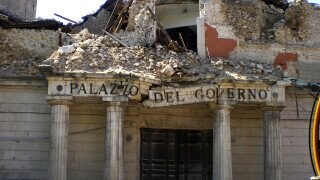Italy Convicted Scientists Of Manslaughter, For Failing To Predict An Earthquake

In 2009, an earthquake hit central Italy, centered on the city of L'Aquila, population 70,000. More than 300 people died, and tens of thousands of people lost their homes. Those in these homeless encampments "should see it like a weekend of camping," suggested Prime Minister Silvio Berlusconi, who always had a flair for relating to ordinary people.
When something like this happens, we often call it an act of God, which is our way of saying that, legally, we have no one to blame. But Italy wanted someone to blame, and they found them in seven scientists from the National Commission for the Prediction and Prevention of Major Risks. At a meeting that March, the scientists had declared their opinions on some seismic activity they'd detected. The tremors indicated an upcoming earthquake, they said, but anything major was unlikely.
The consequence for these scientists wasn’t just some mild public backlash or maybe professional setbacks. Instead, the nation actually charged them with manslaughter. They held a trial that lasted a year, and in October 2012, they convicted the scientists, sentencing each of them to six years in prison.
Don't Miss
Clearly, we shouldn't be punishing scientists criminally for making inaccurate predictions. We especially shouldn't when it comes to earthquakes because they in fact have no way of definitively predicting earthquakes. You might laugh at how bad weathermen are at telling us if it'll rain, but storm tracking is pure mathematics compared to predicting quakes. While scientists record seismic activity, and might note that we're overdue for the big one, they simply have no way of saying "an earthquake is coming on Tuesday, watch out." Maybe our descendants will discover some way, and they'll laugh at how woefully unprepared we all were back in the primitive 21st century.
Fortunately, after two years of appeals, almost all the scientists were acquitted after all, as was a government official accused of dispatching the scientists to deliberately downplay the earthquake risks. One scientist, who'd publicly said that small tremors are good for releasing pent-up energy, a statement that witnesses claimed convinced them to stay indoors and in danger, remained guilty, but even he received just a suspended sentence.
The revised verdict especially benefited one of the more famous scientists, Enzo Boschi. Boschi died at the end of 2018, so had the courts upheld his conviction, he'd have spent his last days in prison.
This fact came from the One Cracked Fact newsletter. Want more like this, straight from your email inbox, without any ads or popups? Join here:
For more earth-shattering stories, check out:
4 Things You Can Only Learn by Surviving an Earthquake
A Geologist Researches Geothermal Energy, Creates An Earthquake Machine
Firefighters Accidentally Destroyed San Francisco While Battling The Great Quake Fires
Follow Ryan Menezes on Twitter for more stuff no one should see.
Top image: TheWiz83/Wiki Commons
